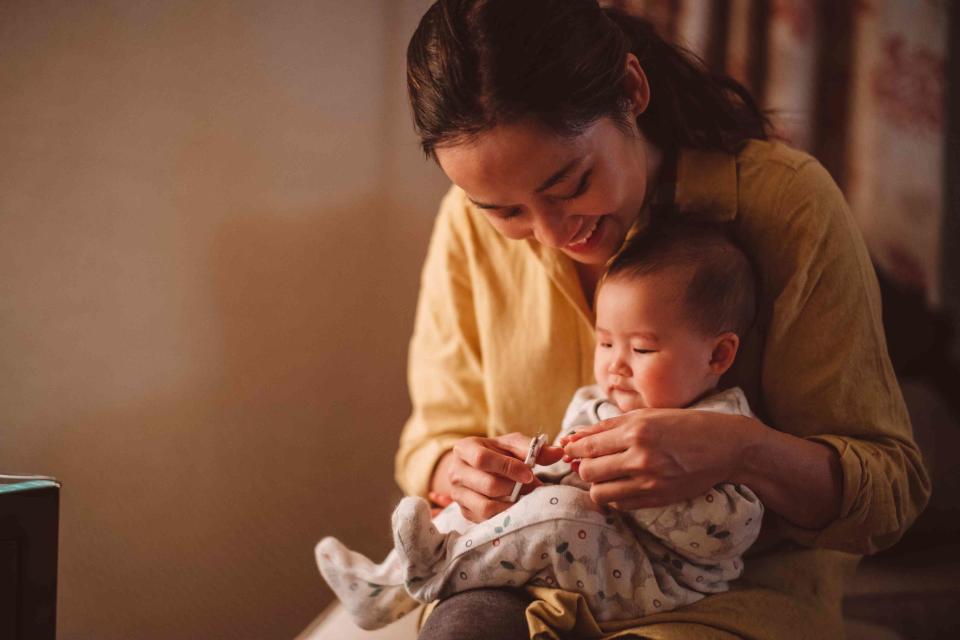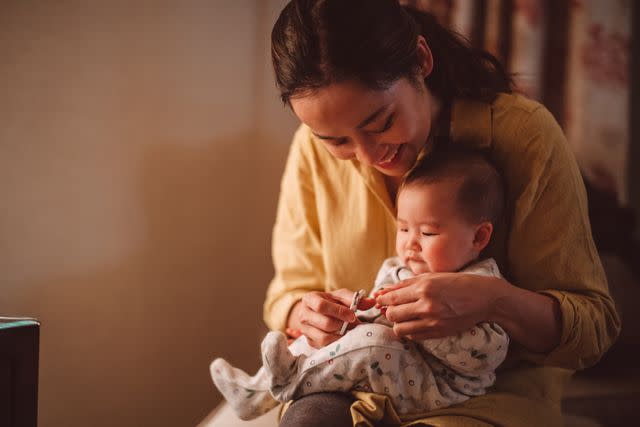Timing of First Period After Baby
Along with cycle changes

Images By Tang Ming Tung / Getty Images
Medically reviewed by Cordelia Nwankwo, MD
Your first period after having a baby can vary significantly from as soon as two weeks to as long as 12 weeks post-delivery. If you’re exclusively breastfeeding, it can take longer to get your first period.
Your first period can also differ from the periods you had before becoming pregnant and can take up to one year to become regular again.
This article looks at your first period after delivery, changes to be mindful of, and conditions that may affect your menstrual cycle.

Images By Tang Ming Tung / Getty Images
First Period After Baby: When Is It Coming?
Most people have their first period between six to 12 weeks after delivery, vaginally or by C-section, although your first period can come as soon as two weeks after delivery. Breastfeeding, along with the mother's health and nutrition, can all affect when your first period after delivery occurs.
It can take up to one year after delivery for your period to become regular again—even longer if you are breastfeeding.
What Is Lochia?
Lochia is a postpartum discharge that occurs after vaginal or C-section delivery. Lochia is usually heavy and bright red for about one week after delivery, then turns pinkish brown before lightening further to cream or white. Lochia typically lasts two to six weeks. Although it can look similar, it is not an actual period.
Changes to Be Mindful of With First Period After Delivery
Your first period after delivery can be different than your periods before you got pregnant, including being shorter or longer or heavier or lighter than what you are used to.
Other changes you might experience with your first period after delivery are:
Heavier periods
Presence of small blood clots
Cramping that is different (better or worse) than before you were pregnant
If you have large blood clots (golf ball-size or bigger), heavy blood loss (enough to soak through a sanitary pad in an hour), or a period lasting longer than seven days, contact a healthcare provider. If you're not breastfeeding, and you still don’t have your period three months after delivering (or within six months after stopping breastfeeding), make sure to contact a healthcare provider in that case as well.
What About the First Period During or After Breastfeeding?
Breastfeeding increases levels of the hormone prolactin, which helps the body produce milk and decreases levels of estrogen and progesterone (hormones that influence menstruation).
Most exclusively breastfeeding people will not have a period for three to six months or longer after delivery. This is known as lactational amenorrhea. You don't need to wean your baby from breast milk for your period to return. You are more likely to resume your period if you go more than a few hours without breastfeeding or your baby is over 6 months old.
If you are breastfeeding and begin having your period, hormonal changes may cause your milk supply to drop. This typically happens between mid-menstrual cycle and when you start your period.
First Period After Baby: What’s Better, Tampon, Pads, Cups, or Underwear?
You should not use sanitary products inside your body, such as tampons or menstrual cups, until your six-week postpartum checkup and your healthcare provider advises you it is safe.
Using these products before then can potentially harm your healing body and increase the chance of infection. You can use sanitary products outside your body, such as pads and underwear, anytime after delivery.
Reasons for Delayed First Period After Baby
Your health and nutrition can affect how soon you have a period after delivery. For example, losing weight too quickly or losing too much weight can cause you to stop having your period. Obesity can also cause irregular periods.
Certain conditions that lead to hormone imbalances, such as thyroid disorders and polycystic ovary syndrome (PCOS), can also cause amenorrhea or the absence of periods. Research on whether these conditions delay your first period after having a baby is lacking.
The research found that 24 % of women with PCOS who had children had amenorrhea at the time of the study and that women with PCOS who had children reported shorter menstrual cycles than women with PCOS who didn’t have children.
How to Initiate Your First Period After Having a Baby
You are more likely to experience a delay in your first period if you breastfeed your baby without supplementing their diet with formula or other foods. Your period is more likely to resume if you go more than a few hours without breastfeeding or begin adding other sources of nutrition to your baby’s diet.
Taking oral contraceptives can also help start and regulate your period after delivery. Do not start oral contraceptives without consulting a healthcare provider about what type of birth control pills, when to start, and any concerns about breastfeeding while taking contraceptives.
If you have sex, you risk becoming pregnant again, even if you have not had a period yet or are breastfeeding. The longer it takes to have your first period, the more likely you will ovulate (release an egg) before your first period occurs, which means you can become pregnant.
Contraception After Delivery
If you are having sex, you can get pregnant and should use birth control to prevent pregnancy. You should talk to a healthcare provider about which type of birth control is best for you. Certain contraceptives, such as an IUD, can be inserted in the delivery room or before you leave the hospital.
You can also start taking progestin-only pills immediately but should wait at least three weeks after delivery to start combination pills containing estrogen and progesterone.
It’s recommended to wait at least 18 months after having a baby before getting pregnant again. Not giving your body enough time to recover between pregnancies increases the risk of premature birth.
Summary
When you get your first period after having a baby can vary greatly from person to person. Though most women get their periods within 12 weeks of delivery, breastfeeding is the most significant factor that can delay it. Your first periods after delivery can be different than your periods before you became pregnant, and it can take up to a year for them to return to the way they were. You can ovulate and become pregnant before your first period, so you should use birth control when you resume having sex after delivery, even if you are breastfeeding.

